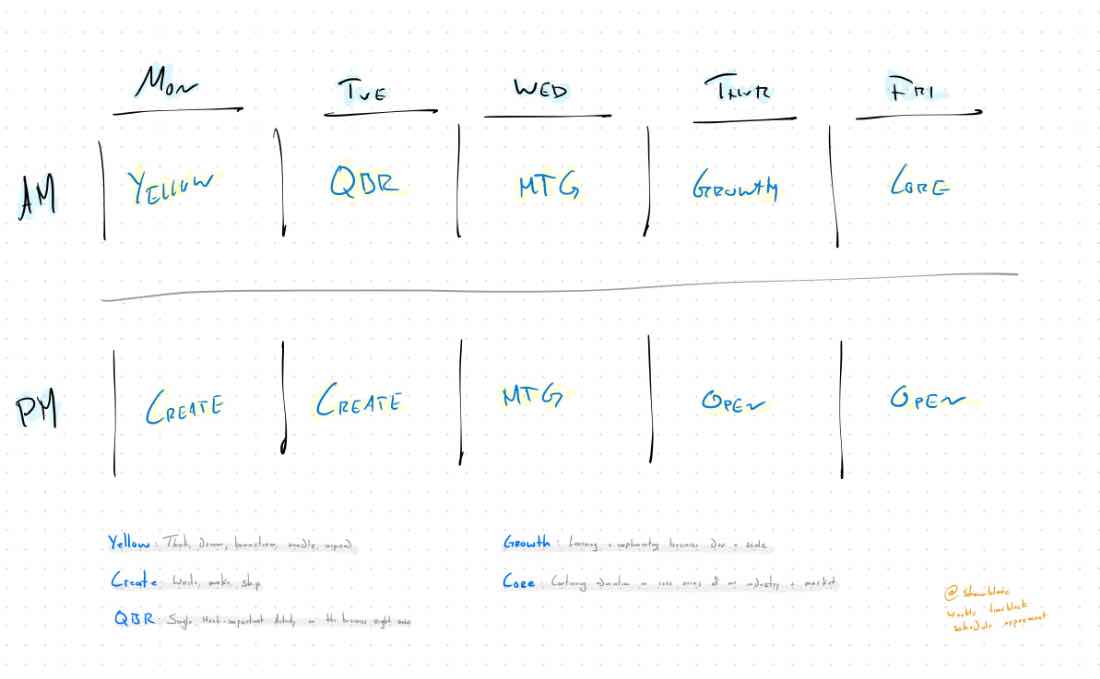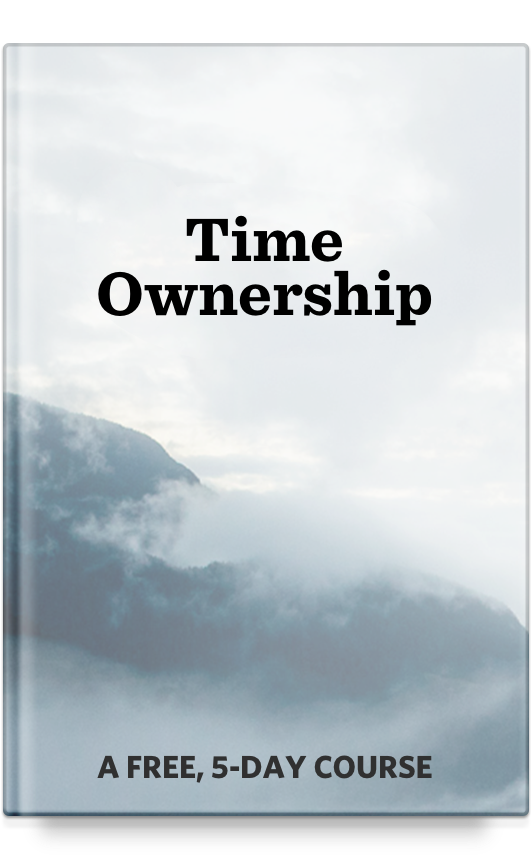Right off the bat, I must confess that the schedule I share below is something I haven’t done very well yet.
But I’m posting about it anyway because it’s an experiment worth sharing about. Even now, as I am just starting to fiddle with it, I know it will still give you some ideas for how to improve your own weekly schedule.
Let’s start with the problem (a problem I bet you can relate to)
The problem: I’m not spending most of my time on the most important things. It’s easy to get pulled into the weeds or get distracted.
The goal: I want to (a) know the best use of my time, and (b) I want to focus on and do those things that matter most.
The solution (an experiment): Create time blocks for my lead measures so I can consistently devote time to these activities, knowing they will move me in the right direction.
How I Got Here
Once or twice a year, I will sit down and consider if I am spending my time on the most important things. Especially so as it relates to my work.
A few months back, I looked over my normal weekly schedule and asked myself some questions.
- Am I focusing on the right things?
- Am I getting the results that I want to be getting?
- Am I the bottleneck for things that someone else is responsible for?
- Is most of my time spent doing the right things?
The thing with goals and schedules is that they are moving targets. You cannot create your ideal schedule one day and then just set it and forget it. These things require maintenance and adjustments.
After answering a few of those questions, I realized that I needed to make some changes.
My Five Critical Activities
And so, I came up with 5 critical activities for my role as the CEO:
- Yellow: Thinking, dreaming, ideating, and connecting dots.
- Create: Making things, writing, shipping work, etc.
- QBR: Focusing on the single, most-important thing for the business right now.
- Growth: Learning and implementing the strategies we need for business development and sustainability.
- Core: Continuing my education in the core areas of our industry and market.
(Definitions: “Yellow” is from the HBDI terminology and it refers to experimenting, finding patters, visionary thinking. QBR stands for “Queen Bee Role” and is from Mike Michalowicz’s book, Clockwork.)
Blocking Time for the Important Things
When I map out the above 5 activities onto my week, here is what it looks like:

Each block of time is a 2-3 hour chunk. One each in each half of the day.
Of these chunks, Yellow is the only one that has no structure, topic, or plan. But I know that if I don’t have time in my week to just noodle on stuff and think about all the “what-if” ideas then I can get frustrated and annoyed.
My QBR time is something that changes in different seasons of the business. Right now, as I write this, my focus for QBR is on implementing business systems and processes so that we have a balanced and scalable business model. As such, the QBR time also overlaps significantly with my Thursday growth time, but it won’t always be that way.
Core time is for my continuing education. Between The Focus Course (and even The Sweet Setup) our core message is for those who care about personal development, meaningful productivity, and doing their best creative work. So anything around the areas of habits, goal setting, time management, energy management, focus, productivity, and the like are all central to our core message. I want to stay in the loop with new ideas, books, apps, and studies in these areas.
What if I can’t keep up?
None of these chunks of time are about dealing with urgent matters. None of those actions must be done right away. None of them have a fire underneath them. Which is great. That’s the point.
And so, because they are not urgent, it means the responsibility is on me to be proactive and intentional about setting aside that dedicated time to focus on the important activities.
If I neglect the important stuff for long enough, then it will become an urgent issue. Crisis will emerge.
Of course, life is life. And my schedule doesn’t always align with this stuff just perfectly. As I said, it’s something I’m just starting to figure out.
And so, even if I don’t keep up with the blocks of time specifically, I can at least look back at my week and track if I was giving any time at all to these activities.
I can ask myself:
- Was I Yellow this week?
- Did I create this week?
- Did I focus on my QBR?
- Did I spend time on Growth?
- Did I spend time on Core?
How to block your own time
My time blocked calendar is based on my 4-Focus Method which states that you need Clarity, Planning, Action, and Celebration.
The 4-Focus Method is something I teach in-depth as part of our upcoming Focus Course Academy.
Without clarity about what is most important, then you will get trapped in a loop of busywork. And so, in this context, I’ve identified the most important uses of my time during the week and I’ve even scheduled them onto my calendar.
For a step-by-step process with yours truly on how to get clarity, define your goals, and then block your time, join us for the Focus Course Academy.
Sign up below and I’ll let you know as soon as enrollment opens up.
